
Irving Berlin was an American composer and lyricist. His music forms a large part of the Great American Songbook.
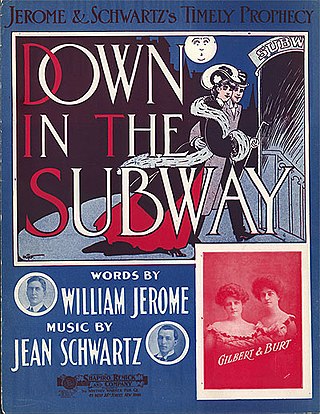
William Jerome Flannery, September 30, 1865 – June 25, 1932) was an American songwriter, born in Cornwall-on-Hudson, New York of Irish immigrant parents, Mary Donnellan and Patrick Flannery. He collaborated with numerous well-known composers and performers of the era but is best remembered for his decade-long association with Jean Schwartz with whom he created many popular songs and musical shows in the 1900s and early 1910s.
Fred Fisher was a German-born American songwriter and Tin Pan Alley music publisher.

M. Witmark & Sons was a leading publisher of sheet music for the United States "Tin Pan Alley" music industry.

"On the Banks of the Wabash, Far Away" was among the best-selling songs of the 19th century, earning over $100,000 from sheet-music revenues. Written and composed by American songwriter Paul Dresser, it was published by the Tin Pan Alley firm of Howley, Haviland and Company in October 1897. The lyrics of the ballad reminisce about life near Dresser's childhood home by the Wabash River in Indiana, United States. The song remained popular for decades, and the Indiana General Assembly adopted it as the official state song on March 14, 1913. The song was the basis for a 1923 film of the same title. Its longtime popularity led to the emergence of several lyrical versions, including an 1898 anti-war song and a Swedish version that was a number-one hit.

"My Blue Heaven" is a popular song written by Walter Donaldson with lyrics by George A. Whiting. The song was used in the Ziegfeld Follies of 1927. It has become part of various fake book collections. Its musical composition entered the public domain on January 1, 2023.
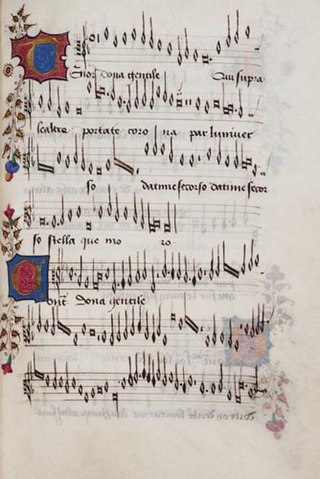
Music publishing is the business of creating, producing and distributing printed musical scores, parts, and books in various types of music notation, while ensuring that the composer, songwriter and other creators receive credit and royalties or other payment. This article outlines the early history of the industry.
"Fools Rush In" (1940) is a popular song. The lyrics were written by Johnny Mercer with music by Rube Bloom.
A song plugger or song demonstrator was a vocalist or piano player employed in the early 20th century by department stores, music stores and song publishers to promote and help sell new sheet music, which was how hits were advertised before good-quality recordings were widely available. Music publisher Frank Harding has been credited with innovating the sales method. Typically, the pianist sat on the mezzanine level of a store and played whatever music was sent up to him by the clerk of the store selling the sheet music. Patrons could select any title, have it delivered to the song plugger, and get a preview of the tune before buying it.
Bernard Bierman was an American composer of popular songs.
Frederick Lawrence Wright was a British songwriter, music publisher, and the founder of the music journal Melody Maker. He used the pseudonymsHoratio Nicholls and Everett Lynton for his songwriting activities.

"After the Ball" is a popular song written in 1891 by Charles K. Harris. The song is a classic waltz in 3/4 time. In the song, an uncle tells his niece why he has never married. He saw his sweetheart kissing another man at a ball, and he refused to listen to her explanation. Many years later, after the woman had died, he discovered that the man was her brother.
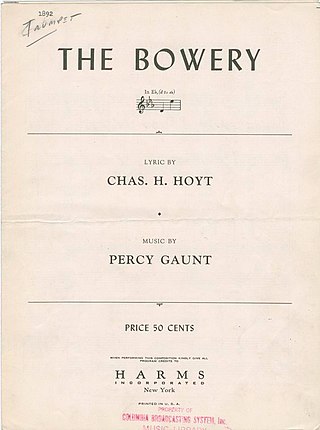
"The Bowery" is a song from the musical A Trip to Chinatown with music by Percy Gaunt and lyrics by Charles H. Hoyt. The musical toured the country for several years and then opened on Broadway in 1891.

Lottie Gilson was a popular comedian and vaudeville singer of the 1880s and 1890s. She was billed as "The Little Magnet" in recognition of her ability to attract and engage audiences. Due to her popularity, she was much sought-after by Tin Pan Alley publishers to boost sheet music sales. Songs particularly associated with Gilson include "The Sunshine of Paradise Alley", "The Little Lost Child", "The Sidewalks of New York", and "My Mother Was a Lady". Her come back song "Just a Plain Little Irish Girl," is the only known surviving recording.
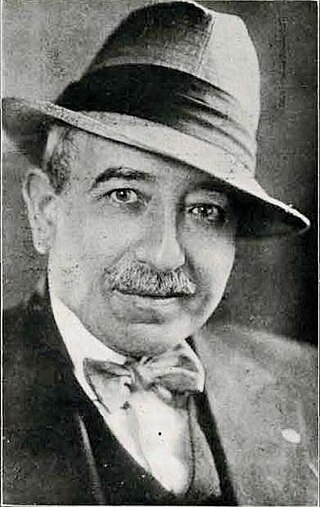
Leopold Feist, in 1897 founded and ran a music publishing firm bearing his name. In the 1920s, at the height of the golden age of popular music, his firm was among the seven largest publishers of popular music in the world. Leo Feist, Inc., ran until 1934. The company used the motto "You can't go wrong, with any FEIST Song."
Forster Music Publisher, Inc. was a major American publisher of popular songs founded in 1916 in Chicago by Fred John Adam Forster (1878–1956). The company had an office in New York and its music was of the Tin Pan Alley genre. For most of its existence, the firm was located at 216 South Wabash, Chicago.
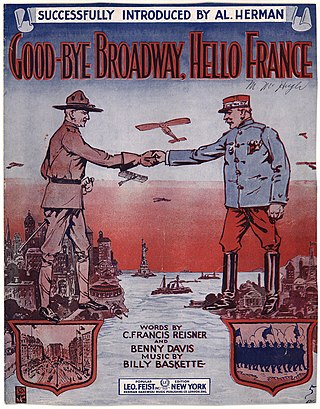
Good-Bye Broadway, Hello France is a 1917 song composed by Billy Baskette, with lyrics written by C. Francis Reisner and Benny Davis. The song was published by Leo Feist, Inc.

André C. De Takacs was an illustrator. His artwork features on the covers of sheet music. He produced art for posters, postcards, and film company promotions. He also wrote music and poetry. The Smithsonian Libraries have some of his song sheet covers in their collection. The University of South Carolina's Tin Pan Alley Sheet Music Collection also includes his work.















